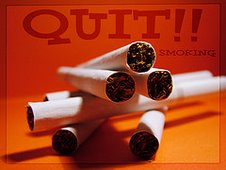Smoking increases the risk of developing all cancers associated with the lips, tongue, mouth, larynx, and oesophagus. The risk of these cancers increases with the number of cigarettes, pipes or cigars smoked. Heavy smokers have laryngeal cancer mortality risks 20 to 30 times greater than non-smokers.
It is well documented that smoking has a direct carcinogenic effect on the epithelial cells of the oral mucous membranes. 95% of all oral cancers can be attributes to lifestyle factors, in particular smoking and alcohol consumption. The most common place for these cancers to occur is on the tongue (20%). Other common areas are the gums (18%), floor of the mouth (12%) and the lips (11%). Pre-cancers also occur 6 times more frequently in smokers than non-smokers.
Those who smoke and drink heavily are at increased risk because alcohol increases the permeability of the oral mucous membranes which is thought to enhance the carcinogenic effect of tobacco based products. Smokers who drink heavily have 6-15 times the risk of developing oral cancer than non-smokers/drinkers. Smokers who do not use alcohol still have a 2- to 4-fold increase in the risk. For both genders combined, cancer of the mouth and pharynx is the sixth most common type of cancer overall in the world.
One of the problems associated with oral cancers is that they often go undiagnosed because the initial signs are painless. Often the smoker will find other reasons for the changes, such as, they must have burnt their lips or they have been biting their lips. There is often an element of fear associated with consulting a health professional. 50% of people die from oral cancers because they have seen a health professional too late.
What to Look For
There are five main symptoms associated with oral cancers:
- Mouth ulcers that don't heal - just because you have had something for a long time doesn't mean that it is harmless. I recall one patient who stated that he'd had the lesion on his lips for over 20 years and he didn't think it was anything to worry about because he'd had it for so long - when he finally did have it checked into it was too late.
- A whitish or reddish patch anywhere in the mouth - this can be painless.
- Swelling under the neck or chin.
- Difficulty chewing, swallowing or talking.
- A persistent feeling that something is caught in the throat.
Use the following steps as a guide for checking your oral cavity.
Use a well light mirror to perform the check.
1. The neck - with your head tilted backward look for any lumps or masses. Then try to feel both sides of your neck and under your jaw line.
2. Lips - feel the inside and outside of your lips using your thumb and forefinger. Look carefully at the area as you do this.
3. Gums - with your lips pulled away so that you can see, examine all of the gums.
4. Cheeks - use your thumb and forefinger to pull the cheeks away from your teeth so that you can see them clearly.
5. Palate - open wide so that you can see the roof of your mouth and the back of your throat.
6. Tongue - with a tissue of piece of gauze in your hand take your tongue and pull it to the right and left so that you can see it clearly - examine each surface. Raise the tip of the tongue to the roof of your mouth and check the floor of your mouth and the underside of the tongue.
If you find anything and you're not sure whether it is a problem, have it checked out by your medical practitioner.
Oral cancers are closely related to the habits of smoking and drinking alcohol. These cancers can be devastating and often go undiagnosed. If you are or have been a smoker, check your oral cavity for changes. Changes you do find should be seen by a health professional. The best thing you can do to reduce your risk of developing oral cancers is to quit smoking. Join a quit smoking program and get the support and assistance you need to become smoke free for good.
Dr Jenny Tylee is an experienced health professional who is passionate about health and wellbeing. She believes that health is not just absence of disease and seeks to actively promote vitality and wellness through empowering others. She encourages people to improve their health by quit smoking, cleansing their body, taking essential vitamin and mineral supplement and many other methods, including herbal remedies.
Article Source: http://EzineArticles.com/?expert=Dr_Jenny_Tylee


